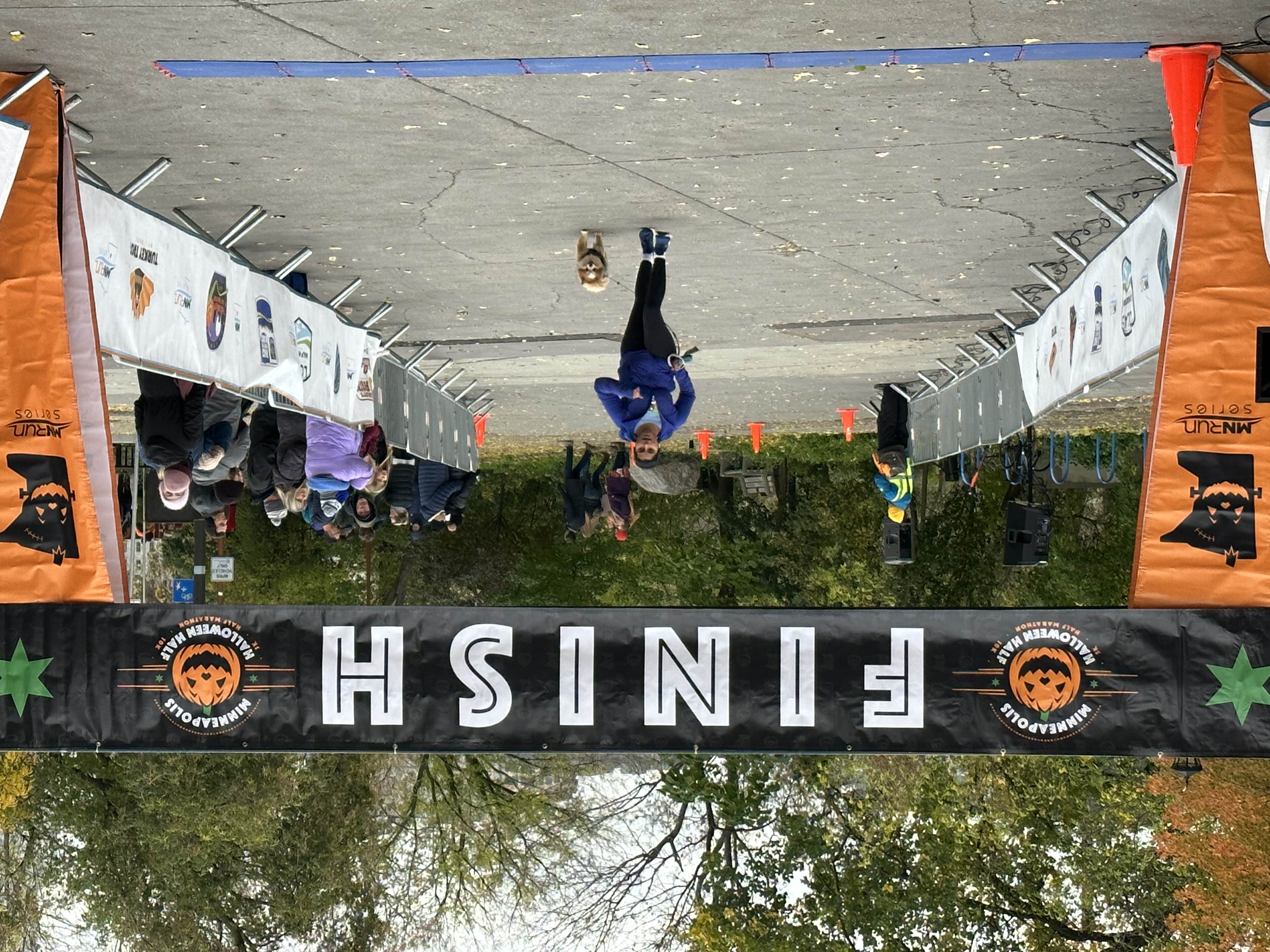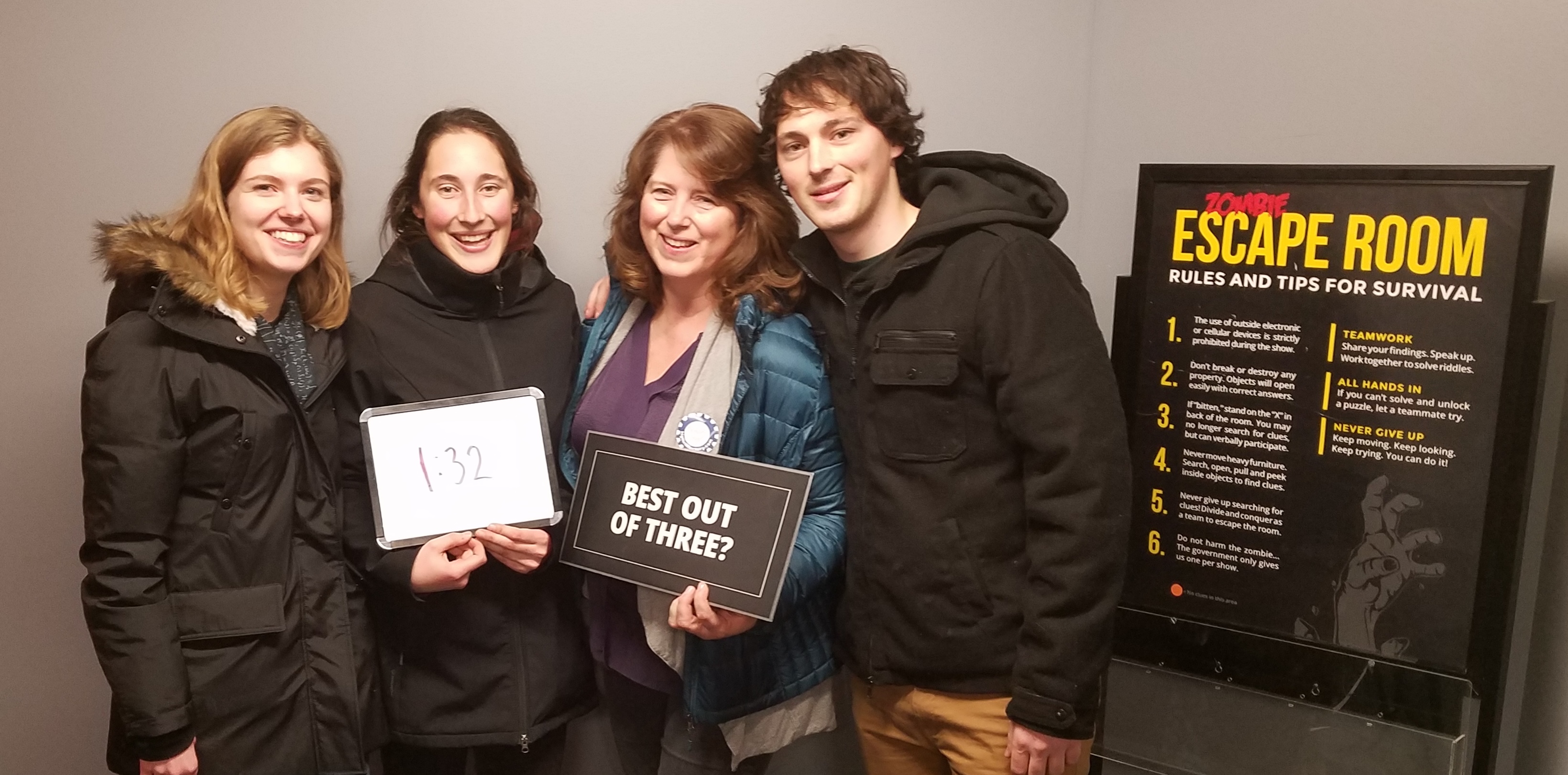PhD Lessons from Running and Escaping Rooms
By Leah Ajmani and Alexis Tarter (She/Her) on
The PhD students at GroupLens have a variety of hobbies! From knitting to playing video games, we all have non-research activities that contribute to our lives. In this article, we asked two PhD students, Leah Ajmani and Alexis Tarter, how their hobbies have helped them become more successful researchers. What does distance running and working an escape room have to do with research? Read below to find out

Leah and her dog, Yogi, finishing their first half-marathon
Lessons from Running
As a very unathletic kid, I didn’t pick up running until I was a PhD student. I’ve run numerous community races in the past two years, including a half marathon! Here’s what I’ve learned:
There’s no such thing as “junk miles”
Sometimes our runs suck. Similarly, sometimes our writing sucks, our research is going slow, or we have to miss a deadline. However, there is no such thing as junk mileage in research. All research, even the research that doesn’t end up in papers, builds our capacity to do research. In that sense, it is useful!
You have lots of different paces; the key is to switch between them
You may have heard “it’s a marathon, not a sprint” about your PhD. The advice here is to go slow and not burn out. Running has taught me to extend the metaphor one step further. I have a marathon pace, but I also have a sprinting pace. I even have a 5k and 10k pace for things in the middle! The key to not burning out is to use the right pace at the right moment.
Think about how you would run a marathon. You may have a “marathon pace,” a goal for each mile to run a certain marathon finish time. For example, my goal is to run a half-marathon in under 2 hrs and 15 min. In theory, I would need to run a 10-min mile 13.1 times. In practice, though, my first few miles would be >10 minutes so I can get into a rhythm. Then, each mile gets progressively faster so I can “ramp up.” The idea is not to just run slow. It’s to run slow at the beginning so that you can go ham and truly race in those last few miles. In a PhD, paper deadlines require you to have enough energy left in your tank to race those last few miles, so be judicious with your pacing.
Your mind will want to quit early and often
In running, we say, “Your mind will want to quit before your body does.” Obviously, if you’re injured or battling physical limitations, you should STOP RUNNING. But if the reason you want to stop running is because your mind is telling you to quit, it’s probably best to keep going.
In research, I use the “quit-three rule.” If I’m reading a paper, writing, or even running, I tell myself that I have to think, “I should quit doing this,” three distinct times before I’m allowed to give up on the task at hand. This rule gives me the ability to pivot off of things that simply will not happen at the moment while still building the resilience to do the things I want to. It’s not perfect! Sometimes, I’m phoning in the task, but it’s a good way to practice focus.

Alexis and friends finishing an escape room!
Lessons from Escape Rooms
I once worked at an escape room, and it turns out it was helpful for my PhD (and it was more entertaining than watching TV).
Ask for help earlier than you think you need to.
Often, groups would come to complete an escape room and be overconfident about their abilities. Maybe they had completed plenty of rooms in the past. Maybe they really enjoyed solving puzzles. Maybe they just thought they were particularly smart. But more often than not, those groups would perform worse than others. Why? Because they didn’t ask for help early and burned precious time on simple problems.
The same flawed thinking can occur in a PhD program. Rather than admitting to your advisor or peers that you are stuck, you may be tempted to battle against a problem all by yourself. Don’t be like those overconfident escape room groups! Asking for help and being vulnerable with others can help you tackle a problem and connect with those around you.
Answers can come from unlikely places.
“Wait…I think I’m Janet!” said my colleague. Turns out a fantastic group had been calling the escape room employee “Janet”, an all-knowing being from the show The Good Place. While, unfortunately, none of us can ask a not-a-girl, not-a-robot character the answer to any question in the universe, we can find answers in places we least expect them.
The same is true during a PhD program. While courses and your advisors are key sources for support, engaging with experiences that bring you joy is also vital. Maybe the family member you are trying to describe your project to can help you find a way to frame your research question. Maybe the crafting event on campus introduces you to another student with whom you can collaborate. Maybe an intramural pickleball game clears your mind, and you discover the next direction for your dissertation topic. A PhD program is a time to explore not only intellectually but also personally.
Communication is key.
Escape rooms are all about effective communication, whether it is joining hands to close a circuit, yelling out numbers from around a corner, or describing what’s inside a hidden room. It is astounding how many times I’ve seen a teammate find the key to solving a puzzle and put it silently in their pocket. As one of my favorite characters states, you have to “talk it through, as a crew.” – Stede Bonnet, Our Flag Means Death.
And, as I am sure you’ve noticed the trend by now, the same applies to a PhD program! Unfortunately, some lab and campus cultures discourage meaningful connections and collaborations. It is crucial in those situations to find people you can communicate with such as a support office or friends and loved ones. However, in all situations, it is how we talk to ourselves and with others that often determines how successful we can be.
Whether it’s running, escaping, or even knitting, inspiration is everywhere for being a successful researcher! Which hobbies have helped you as a PhD?